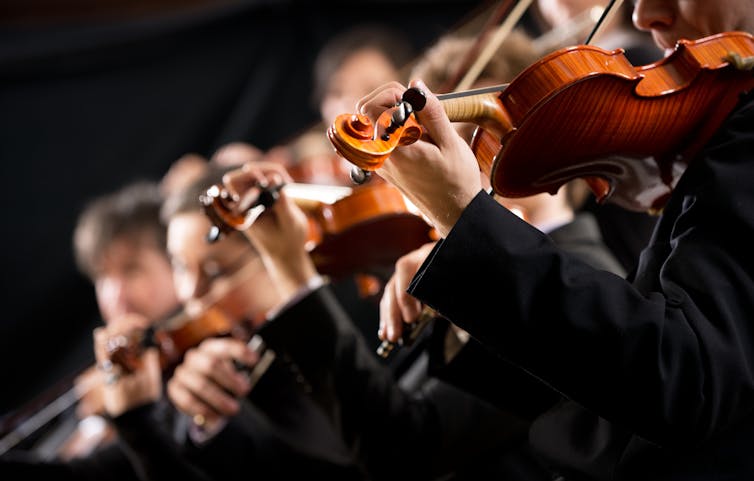Hollywood may be able to afford #MeToo, but it’s a stretch for the Australian arts
- Written by Luke Hopper, Lecturer, Edith Cowan University
Sarah is an aspiring actor, recently graduated from a prestigious acting school. She lands her first contract with a major theatre company to work with a respected director. The play includes performance of a simulated rape scene. Over the weeks of rehearsal, Sarah finds it difficult to get out of the role and relax. She becomes increasingly angry at her boyfriend and finds she can’t keep the role separate from her life. She can’t sleep well. Yet she is encouraged by the director to “ride the wave of emotion”.
Sarah speaks to the stage manager who has been tasked with the new role of mental health first aid officer in the company. She is told to seek help from a psychologist - who she can’t afford. The director is frustrated by Sarah’s increasing disconnection with the play as she goes through the motions. She completes the season. Nine months later she has not received a single call-back from any auditions, still isn’t sleeping and is working in a café to pay the rent
Sarah’s story is a composite of actors’ responses from the 2015 Actors Wellbeing study and entirely emblematic of the state of affairs within Australia’s performing arts scene.
This industry is fraught with extreme financial pressures, a highly casualised workforce and endemic competition. The performing arts are also rife with preventable mental health issues, compromised physical health and addiction.
In short, this is no fertile garden for the #MeToo movement to gain root.
Read more: Out of character: how acting puts a mental strain on performers
The movement has undoubtedly opened up an important discourse, challenging the stigma of speaking out against exploitation and harassment in the arts and other industries. Live Performance Australia, Screen Producers Australia and the Media Entertainment & Arts Alliance, in a joint initiative, have released a new code of practice on discrimination, harassment, sexual harassment and bullying. This is a significant step.
However, the larger task remains to engineer a genuine culture shift at the grassroots of the arts; to adequately support artist wellbeing in a competitive and under-funded sector. Real culture change doesn’t come cheap. It takes money, time and resources and on that front, Australia is a long way from Hollywood.
In our competitive and underfunded sector, power relationships are ever present. It is simply too easy for an artist to not be selected for future contracts if they are perceived to have had mental or physical health issues in the past. Young artists have very strong motivation not to disclose such issues and risk succumbing to career-ending illness or injury.
Performing artists across Australia are thrust into the sector, usually with poor business acumen, only to chase intermittent and largely unsupported contracts. Serial unemployment in a chosen form of creative expression is considered the norm for the majority of those committed to an arts career, influenced in part by socioeconomic status and geographical location.
Performance in every sense of the word requires the combination of talent and commitment. This naturally places stress on the mind and the body. Regardless of artistic discipline, there is a growing body of evidence that paints a disturbing picture of the health issues associated with being an artist.
Eighty four per cent of Australian orchestral musicians have been reported to experience sustained, performance-limiting pain.
 Many orchestral musicians experience sustained pain.
Shutterstock
Many orchestral musicians experience sustained pain.
Shutterstock
Psychological risk factors such as disordered eating, sleep and social support have been related to the high frequency of injury in dancers. Depression, substance abuse and suicide attempts were frequently reported in a 2014 survey of nearly 3000 Australians working across the spectrum of performing arts genres.
Artists are often unaware of the healthcare support available to them and rely on teachers and arts management for such advice. In turn, healthcare providers often aren’t aware of the demands of working as an artist and the severe effect incapacitation has on an artist’s identity and career.
Read more: Artists' welfare: why it's time to act
Major arts organisations with adequate funding are leading the way in recognising health issues in the arts. Community organisations such as the Australian Society for Performing Arts Healthcare and the Australian Alliance for Wellness in Entertainment are building awareness and a network of support for the arts community. But these organisations all work in the face of the larger underfunded and casualised arts sector.
While the industry is certainly supportive of #MeToo in the broader sense, real change will only occur through structural change at its core.
The benefits and possibilities of bespoke health support in the arts are exemplified by initiatives such as the UK-based National Institute for Dance Medicine and Science (funded by both the NHS and the community), which provides access to high quality, affordable, research-informed and dance specific health care.
Government and philanthropic funding to establish best practices in education and healthcare delivery is the next essential step in supporting the thousands of Australians whose profession and livelihoods are dedicated to arts.
Authors: Luke Hopper, Lecturer, Edith Cowan University



















